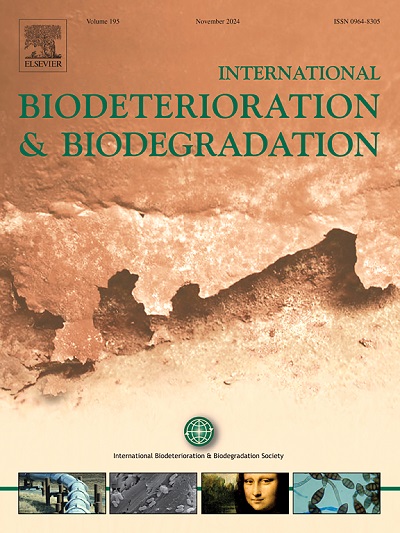Enhanced degradation of crude oil by immobilized bacterial consortium through eliminating microbial flocculation towards crude oil
IF 4.1
2区 环境科学与生态学
Q2 BIOTECHNOLOGY & APPLIED MICROBIOLOGY
International Biodeterioration & Biodegradation
Pub Date : 2024-10-02
DOI:10.1016/j.ibiod.2024.105935
引用次数: 0
Abstract
Microbial degradation is considered an effective and sustainable technique for the remediation of oily sludge; thus, the acquisition of crude oil-degrading bacteria is crucial for effective bioremediation. This study introduces a novel domestication-enrichment-isolation (DEI) strategy to isolate crude oil-degrading bacteria from oily sludge. Two strains, Rhodococcus rhodochrous JS-24 (R.rh) and Gordonia cholesterolivorans JS-13 (G.ch), demonstrated the highest degradation rates of 53.7% and 34.6%, respectively, within 7 days. While no synergistic effect was observed with their combined use in free bacterial consortia, and the overall degradation rate decreased to 51.9 %, which was weaker than that of R. rh treatment alone. The decrease in degradation rate is attributed to microbial flocculation towards crude oil: most droplets of crude oil were encapsulated into spherical aggregations by G. ch, thereby hindering the contact and degradation of droplets by R. rh. In contrast, immobilization technology significantly enhanced crude oil degradation by eliminating this flocculation effect. The immobilized bacterial consortium achieved a 95.5% degradation rate, representing the highest degradation rate reported for bacterial consortia. This study reveals for the first time that the side effects of bioflocculation on crude oil degradation and provides guidance for the construction of bacterial consortium.
通过消除微生物对原油的絮凝作用,提高固定化细菌群对原油的降解能力
微生物降解被认为是一种有效且可持续的油性污泥修复技术;因此,获得原油降解细菌对于有效的生物修复至关重要。本研究介绍了一种新型的驯化-富集-分离(DEI)策略,用于从含油污泥中分离原油降解细菌。两株菌株,即 Rhodococcus rhodochrous JS-24 (R.rh) 和 Gordonia cholesterolivorans JS-13 (G.ch),在 7 天内分别表现出 53.7% 和 34.6% 的最高降解率。但在游离细菌群中联合使用这两种细菌时,没有观察到协同效应,总体降解率降至 51.9%,比单独使用 R. rh 的降解率低。降解率下降的原因是微生物对原油的絮凝作用:大多数原油液滴被 G. ch 包裹成球形聚集体,从而阻碍了 R. rh 与液滴的接触和降解。相比之下,固定化技术消除了这种絮凝效应,从而大大提高了原油降解效果。固定化细菌联合体的降解率达到了 95.5%,是目前报道的细菌联合体中降解率最高的。这项研究首次揭示了生物絮凝对原油降解的副作用,为构建细菌联合体提供了指导。
本文章由计算机程序翻译,如有差异,请以英文原文为准。
求助全文
约1分钟内获得全文
求助全文
来源期刊
CiteScore
9.60
自引率
10.40%
发文量
107
审稿时长
21 days
期刊介绍:
International Biodeterioration and Biodegradation publishes original research papers and reviews on the biological causes of deterioration or degradation.

 求助内容:
求助内容: 应助结果提醒方式:
应助结果提醒方式:


